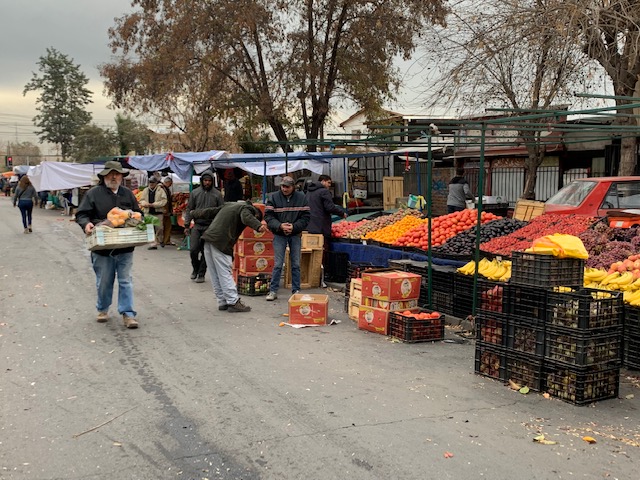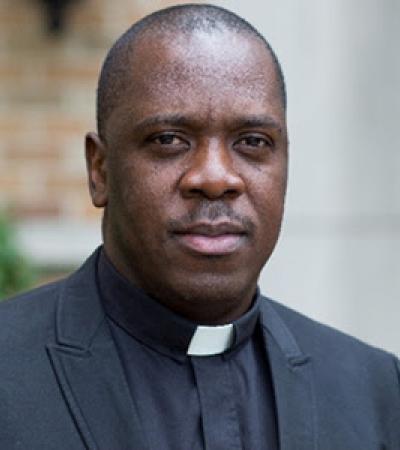Theological Resistance to Economic Injustice: Comparing Political and Economic Theology in Latin America & Africa
Graduate Research Grant

I want to explore, research, and liaise with academic communities and personnel with experiences in my areas of interest; Political and Liberation theology, and apply their theological tools to the Nigerian political and economic problems. Chile and El Salvador offer me a platform to interact with resources and persons that are knowledgeable in these areas of interest. In Chile, Professors Cristian Hodge and Fredy Parra who are experts in the theology of economics, and theology and human rights and are of the Pontificia Universidad Catolica de Chile will be helpful resources for my study. And in El Salvador, I will engage Fr. Jon Sobrino who teaches at the theology department of Universidad Centroamerica, (UCA) in San Salvador. An encounter with Sobrino will deepen my thoughts and offer new insights into my research on Liberation theology. Moreover, with the image of Oscar Romero (and his theological resistance against an oppressive government) looming large over the Church of El Salvador, the context of the country and its Church will offer me deep insights into the intricacies in the Church’s theological activism against government’s abuse of economic rights of the people. My interaction with these theologians will help to deepen my thoughts and my research on political and liberation theologies.
Report
Upon my arrival in Chile, I met with Fr. Diego Irarrazaval. Irrarazaval was part of the developmental stage of Liberation theology from the late 1960s to 1970s. He was well informed about the “conflicts” between the proponents of liberation theology in Latin America and the Vatican officials of the Congregation for the Doctrine of the Faith (CDF). He mentioned that the suppression of the publication on liberation theology and the unemployment of liberation theologians in Pontifical Universities in Latin America was due to the suspicion of the CDF about liberation theology. However, with Pope Francis, the cloud of suspicion that hovered over liberation theology for decades has been lifted. Irrarazaval affirmed that the background of Pope Francis in Peronism and theology of the people did not only influence his writings but disposes the world to identify the theological authenticity of liberation theology, and its relevance to contemporary theological thinking.
My conversation with Irrarazaval was insightful. It offered me deeper insights into relationality between the theology of the people, liberation theology, economic and theological thinking. Irrarazaval affirmed the connection between liberation theology and the trending research on the economic and theological thinking in Latin America. For Irrarazaval, research on economics and theological thinking is gaining traction in Latin America, especially with centers in Pontifical Universities in Brazil and Costa Rica.
I then went by the metro train to the Pontifical University of Chile, San Joaquin. I checked in with the Notre Dame office at the university and met with the director of the office; Juan Estaban Montes. In our discussion on my research on the intersection of economics and theological thinking, Montes offered an exciting insight into the Chilean economy that's worth investigating in the near future. Montes mentioned that several of the former ministers of Finance in Chile had links with the Christian Democratic Party. The party centered its economic policy on the Catholic Social Teachings. However, the last time the party won a presidential election was in 1994. Hence, it will be exciting to see how and why the members from the party have continued to occupy the Chilean office of finance. Moreover, it will be helpful to see if the party’s economic policies have had any impact on the Chilean economy.
I then started my session with Professors Fredy Parra and Christian Hodge. My session with Christian Hodge centered on theology and economics. He introduced me to the thoughts of authors like Stefano Zamagni, Raul Gonzalez, Gabriel Zanotti, and Gregory Mankiw. He was also disposed to the capability theory of Amartya Sen. Hodge established a crucial link between the civil economy and Catholic Social Teachings. He concluded that the economic blueprint of the Church was laid in Centesimus Annus and Caritas in Veritate, and as such, affirmed extreme importance of both documents.
On the other hand, my session with Fredy Parra was centered on the validity of liberation theology, also, on the relationality between Jean-Marc Ela and Gustavo Gutierrez on the concept of the poor. Fredy Parra repeatedly validated liberation theology as “orthodox.” He emphasized that the papacy of Pope Francis has helped to shed light on the relevance and authenticity of liberation theology. Parra considered the Pope as a product of liberation theology, hence, his open relationship with Gustavo Gutierrez and other liberation theologians. Also, he identified strong similarities between Ela’s and Gutierrez’s concepts of the poor.
Chile has been regarded as one of the thriving economies, and Santiago as one of the costliest places to live in Latin America. However, evidence in some parts of the city indicates that some people could not afford a decent standard of living. As such, a weekly open groceries -market called Feria became a major means of softening the pangs of the high cost of living on those with little means. The idea of the open market was to make groceries affordable to those with little means and it was decentralized such that there were many spots all over Santiago.
Feria provides a potential research interest especially on its possible relationality with the laisse faire capitalism and the economic ideology of the Christian Democratic Party. It will also be of interest to identify the structure of this market. That is if it is structured on the principle of subsidiarity, or it is government-organized, or a vestige of the pre-Pinochet socialist economy.
Like many thriving economies, the city of Santiago presents the sharp difference between economic comfort and discomfort. While some areas (like Vitacura ) within the city show a reasonable level of economic comfort, some areas (like part of Penalolen) show a reasonable level of economic discomfort. Such discrepancy provokes some fundamental questions like: if Chile is a thriving economy, and there is evidence of poverty in its major city, how do we measure economic growth? Also, what is the role of religion in a “thriving” economic structure that favors some and not the others?






